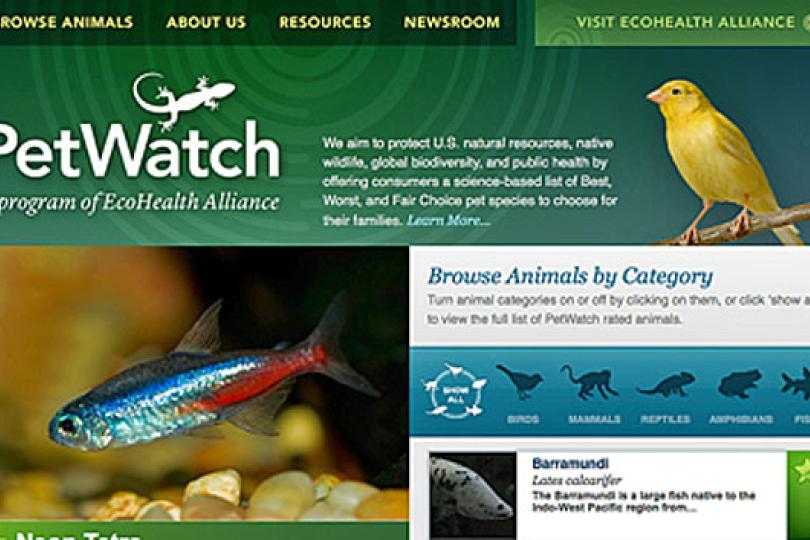PetWatch website launches
EcoHealth Alliance (formerly Wildlife Trust) has launched a new program called PetWatch, a first-of-its-kind mobile-friendly website that guides consumers to make informed decisions about exotic pets. Rooted in scientific research on global wildlife trade, PetWatch provides rankings for the Best, Fair and Worst choices of exotic pets for the well being of your family and the environment.
Switzer supported the development of PetWatch with a Collaborative Grant to Fellows Kate Smith (2004) and Myra Finkelstein (1998), who developed the project for EcoHealth Alliance.
Other supporters included the Cestone Foundation, EcoHealth Alliance, Brown University, and individual scientists who volunteered their time to research and review the species ranked by the program.
As the press release about the launch states: "The program’s foremost goals are to protect natural resources, native wildlife, global biodiversity, and public health from non-native wildlife entering U.S. borders. Scientific experts from multi-disciplinary fields such as conservation biology, disease ecology, invasive species biology and veterinary medicine developed the Best, Fair and Worst choice pet rankings for over 50 exotic species. All of the rankings are presented on a first-of-its-kind, mobile-friendly website (www.PetWatch.net) geared towards consumers to help provide insight and education surrounding exotic pet ownership for one’s family and home."
According to the release, "The scale of the global wildlife trade is extraordinary and the illegal portion of this trade is estimated at $20 billion per year – the second largest black market category next to narcotics."
The website allows consumers to browse animals by category (birds, mammals, reptiles, amphibians or fish) or to see the entire list of PetWatch rated animals. Pets like the Betta (or Siamese Fighting Fish), the Cockatiel, and the Chinese Fire Bellied Newt all received "Best Choice" pet ratings. The Squirrel Monkey, Burmese Python, and Bushbaby are rated as "Worst Choice" pets.
Animals were rated according to the following criteria:
- Source Sustainability - Does the harvest for wildlife trade or captive breeding of this species harm wild populations?
- Invasion Threat - Does the release or escape of this species into the wild harm the environment and/or economy?
- Animal Welfare - Does harvest, captive breeding, transport, or being kept as a pet harm individual animals?
- Health Threat - Does this animal pose a health risk to native wildlife, humans, livestock and agriculture?
EcoHealth Alliance will be releasing an app for the iPhone and iPad this summer, according to the website.
You can view the Switzer Network News report about the project and read a summary of the Collaborative Grant.
